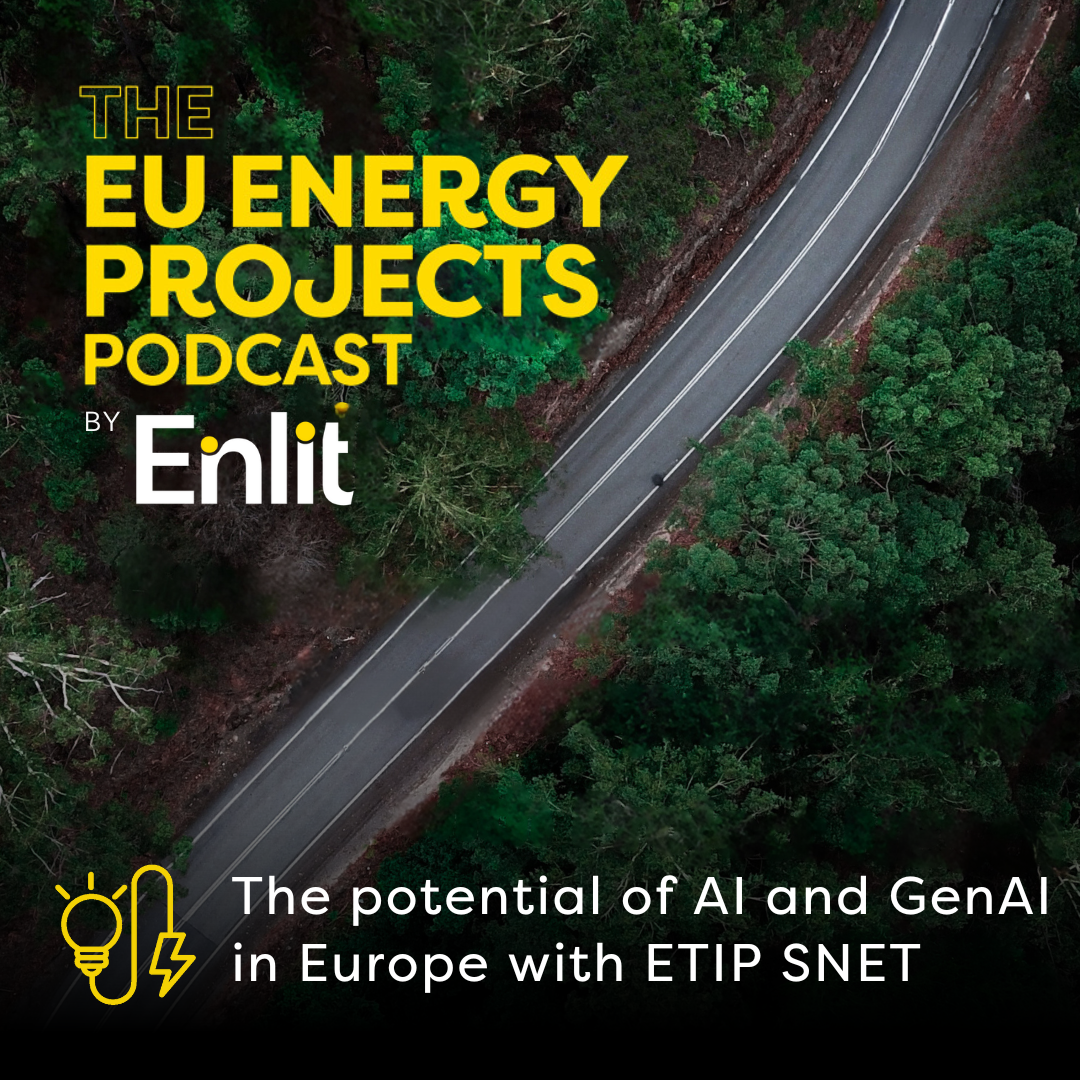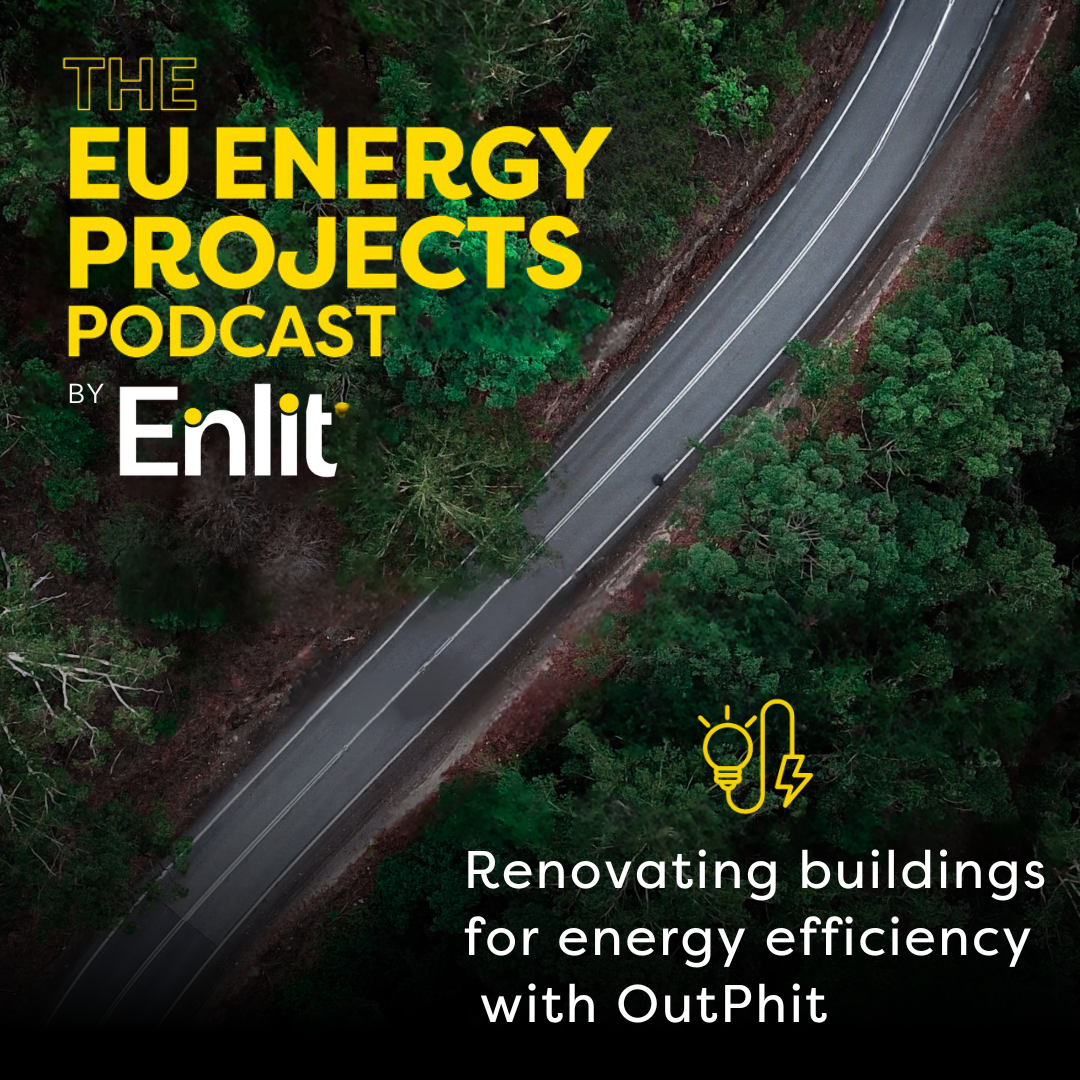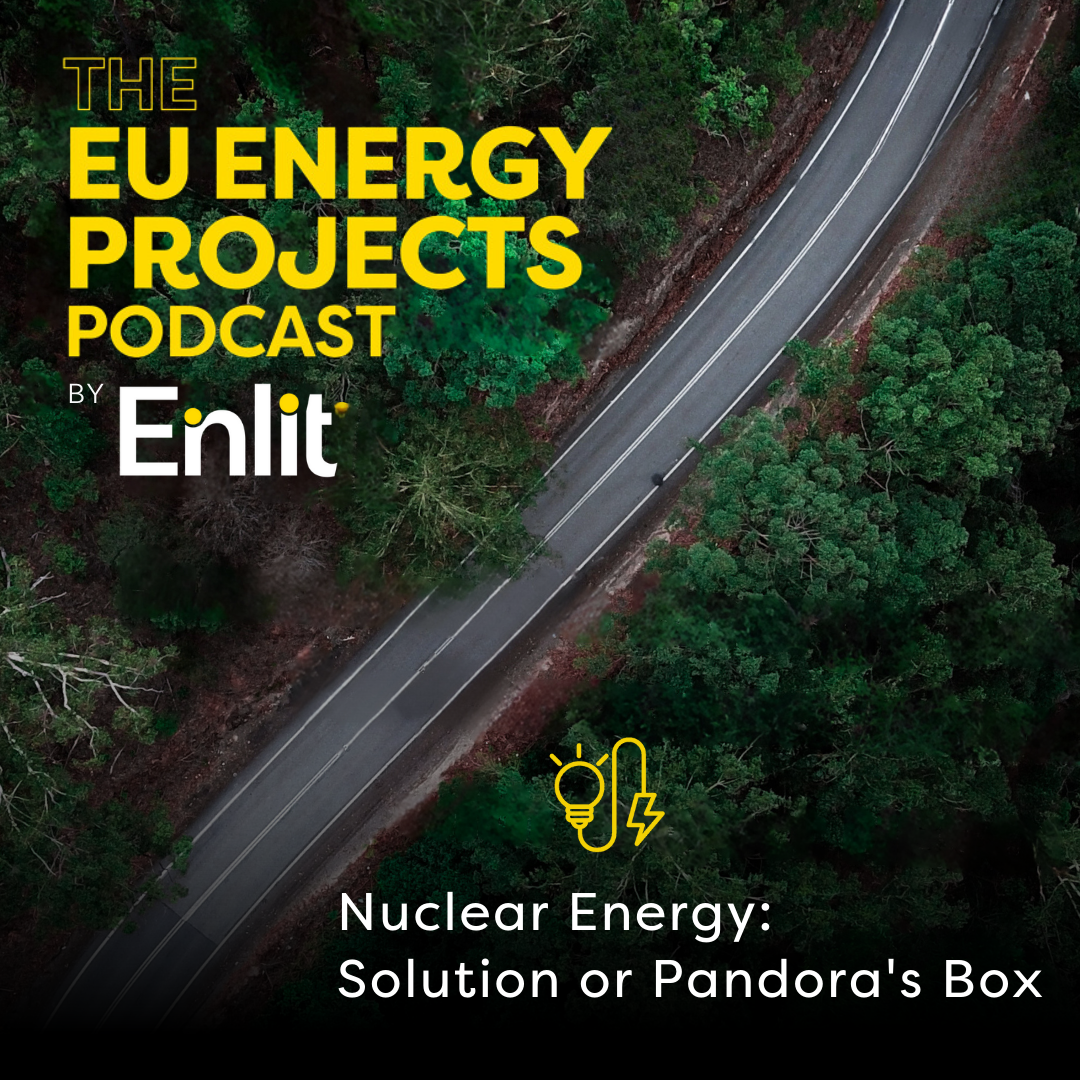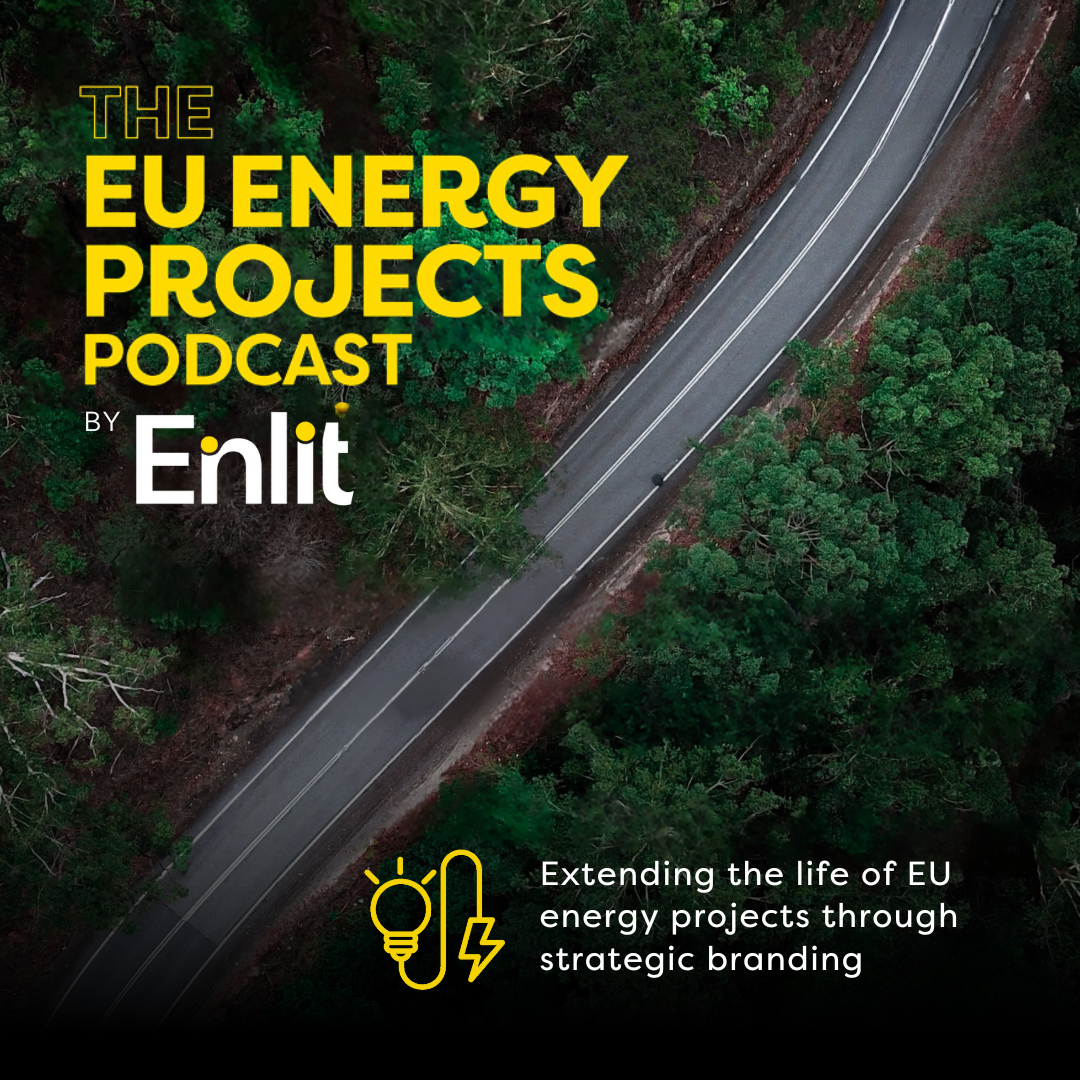Episode Transcript
[00:00:10] Speaker A: Welcome to the EU Energy Projects Podcast, a podcast series from Enlida and France focusing on the clean energy transition for the European Union and the EU Commission funded energy projects that will help us achieve it. My name is Aretid Daradimu. I. I am the editor of the EU Energy Projects Podcast and your host.
We recorded this episode of the EU Energy Projects Podcast during the Impact Circle of ENLIT Europe. Luis Cunha, Chair of ethipsnet and Director of European Policies and Projects at eredis, is a member of the ENLIT Europe Impact Circle. I had the opportunity of discussing with him the latest etipsnet white paper which is Unlocking the Potential of Artificial Intelligence and Generative AI and Smart Grids A Guide for Action hey Luis, and thank you very much for being here with me today.
I was actually reading the Unlocking the Potential of Artificial Intelligence and Generative AI in Smart Grids a Guide for Action that etipsnet created and you are one of the co authors and also the overall coordinator, is that correct?
[00:01:33] Speaker B: Yes indeed. And thank you very much for asking me this. It's a pleasure also from our side at ipsnet to explain you a little bit the process behind this paper and why we are doing the paper and what is the goal of this paper?
[00:01:45] Speaker A: Exactly. So let's start. First things first, tell me, what is is this paper about? In a nutshell?
[00:01:53] Speaker B: Yeah. This paper is about the impact of AI and most notably generative AI in smart grids. This is what the paper is about.
[00:02:00] Speaker A: And why do you think it's important? Why did you do it? Why did you write it?
[00:02:05] Speaker B: We write it. It's a twofold thing. So the first one is that we started looking into AI two years ago and suddenly realized that it became something really pervasive across our industry and also across our own lives. And we decided that it should be something important to address as soon as possible. At the same time, the European Commission also approaches us because they are working now on they are revisiting the Digitalization of Energy Action Plan and they want to know the industry view on the AI and Generative AI and they think they consider etipsnet to be one of the best channels for them to get this kind of viewpoints.
[00:02:48] Speaker A: So the first draft from what I understand is already out and people I assume can get back to you with suggestions, reviews, etc.
[00:02:57] Speaker B: Yes, let me explain a little bit the process. So we start late November last year with a very, very challenging goal that is having everything ready by the 4th of April this year. So it give us around 4 for complete months to do this job. So we are starting by addressing the context, the policy, and then we go to the last mile, which is the concrete implementation, the roadmap. So it's a very challenging job because we are covering every single angle that relates to AI and Genai adoption in our sector.
[00:03:32] Speaker A: Getting back to your question, my question was whether our audience would be able to read the draft and get back to you.
[00:03:40] Speaker B: Why the draft? So if you read the draft, the first page of. If you have time only to read one scene, read the first page, the COVID page of the draft. There is a disclaimer there where we say that the first draft is the only intention to provide, to provide a driver for people to react. So it's not really the final draft, it's not really about the contents, it's about getting people around the producing of this paper. So we want people to criticize, we want people to provide different viewpoints because we are embracing such a novelty topic that we need all the different angles to be sure that we are not forgetting what is the most important thing.
And this is why we publish so early the first version of the paper. It's already a complete version because we are covering the six chapters. But we are now in the phase of revising the first version and producing the second version. And we already know that a lot of things are going to be changed.
[00:04:42] Speaker A: Okay, then I guess our audience will be able to read it. We will make sure to upload it on our website and also to have it as part of our LinkedIn newsletter, the list that is dedicated to EU project zone and to EU funded projects. But let's go a little bit to the focus, to the paper itself. My first question to you is about the role of AI and generative AI in transforming smart grids. Why do you think it's important?
[00:05:09] Speaker B: I don't think it's important. I think we don't need to explain that AI is here to stay. And if you allow me, just a side note, I think that AI is really transformative. Not as a new technology. I think some people compare it to the Internet, but I think it's very different because for the first time in our lifetime as human beings, we are producing something that might happen to be clever, more clever than we are. That is really a very challenging issue to deal with. So going, going back to the AI and generative AI, I think this is one of the questions that we got from a lot of people. And if you have the opportunity to attend the webinar that we had a couple of weeks ago, the first slides of the webinar was exactly to differentiate between AI or traditional AI and generative AI. So the thing is that we have been using AI as an industry for, I don't say, maybe 10 years probably. So with a lot of algorithms and a lot of machine learning stuff, we use it mostly for planning and also for forecasting and things like this. The new thing with generative AI is that we are capable of creating new things out of the blue. It's not really out of blue, it's out of some data that we already have. But this generative AI thing allow us to produce what we call synthetic data. And having this capacity to build new data, then we are able to produce new scenarios. And that will allow us to have different views on the way we plan, we operate and we manage our networks. And also the interaction of the networks with external world. This is really important because at the same time we are embracing a new capacity or a new capability and also complying in a compliance mode with all these data protection issues that we have nowadays. So I think we are open totally new door that will allow us to do much better than we have done so far and with tools that we don't even imagine. For the time being, I would like.
[00:07:09] Speaker A: To discuss a little bit policy and regulations both on the European and a global level. But let's start with the European level. Can you give us a little bit an overview of the regulatory landscape for AI in Europe?
[00:07:22] Speaker B: Yeah, I think AI has been doing a great job. I say a great job because it's rooted in the European values. But at the same time we need to acknowledge that it's very challenging because we are putting a lot of not Chinese walls, but a lot of blocking points in the way we can embrace AI that is good on one side, on the safety side, but at the same side, when you compare our, our approach to other geographies across the world, China, United States and even uk, that is a neighbor, close neighbor to us, we will see that this is slowing our pace in the adoption of AI technologies. I would say that this life we need to live, we are Europeans, we appreciate the way we live, so we need to cope with that. But at the same time, the AI act puts a lot of effort on top of the normal usual players from vendors to the ones that are going to use these applications, the DSOs and the TSOs. And this is something that we are still digesting, I would say. So the act imposed is a very strict timeline.
Some of the things are going to be in place already this summer. Others will happen next summer. Right now we are working on that. At the same time, it's important that we don't look at AI in an isolated form. So AI is also connected with the other main pieces of legislation from our sector, which are namely the Green Deal. So we keep this idea of promoting renewable integration and bringing citizens on board. This is the main point of our transformation when it comes to energy. And at the same time we have this new motto coming from the commission which is to push further from our industry. And this is quite relevant at this present moment in time, because it's not only that we need to revamp somehow our industry, but at the same time that we are now in the middle of geopolitical fights and we need also to reaffirm Europe and make sure that we differentiate ourselves from the other geographies by leveraging on our concrete values that we have as European, but at the same time making sure that we use our capacity to create some differences when it comes to value adding.
[00:09:45] Speaker A: Well, when you. When you look at the global AI landscape, would you say that we are front runners?
[00:09:50] Speaker B: No, no. I think I will be lying to you if I say that we are front runners. I think that if we look at some concrete data, there are at least two reports that the rest is the topic of AI and smart grids from the angle of patents, or I mean the tangible side of innovation. And we see that we used to be maybe a couple of years ago, second, third place when it comes to global landscape. But nowadays I think we are far from that. I think that the most recent data show us that we are recovering a little bit, but still we need to align ourselves. And indeed, I think it's funny that we speak about Europe, because in the end we have 27 different Europes in Europe. And that is one of the problems when it comes to technologies like this one. So I think in our particular industry we are sometimes lagging behind when it comes to innovation. We consider ourselves to be very innovative. And I also agree with that. But at the same time, I think if we compare our industry to other industries like banking or telecommunications, we have a lot also to learn and to capture when it comes to synergies. So in AI stuff, I mean, the 27 must become 1, because otherwise it will be very difficult for you to, to keep up with the pace.
[00:11:06] Speaker A: Speaking of the 27 and the 27 Europes, as you said, which is very much to the point, would you say that you see huge differences in regulation and implementation in the various member states when it comes to AI.
[00:11:20] Speaker B: Yes, yes, indeed. We sit also with smart grids, with smart metering, with everything that relates to our activity. And it's even sometimes I realize that we know that regulators work very well together also at European level. But sometimes I think we are a little bit, if I can say that, surprised because we see that when something new comes, we see regulators, some regulators acting very fast and really changing the context and the environment, but others lagging behind. And this is really something that it's a bottleneck, a real bottleneck for the advancement of European industry.
[00:12:01] Speaker A: Another quite interesting topic, let's say, or subtopic in the paper, is that focuses on DSOs and TSOs and the AI act implications for them.
Could you give us, let's say, your perspective? What are the implications, let's say, for DSOs?
[00:12:19] Speaker B: It's even difficult to list all the implications. I think there are people that are now trying to understand it better. But I think if we just being very pragmatic, the first implication is that we need to make sure that the systems that systems or models in our AI applications that are considered as critical, they will need to be certified. And this is something new.
At the same time, we also need to take into consideration that we have a huge legacy system in place. And changing these systems to AI driven systems is also something that will take us a lot of effort. And making this compatible within the time frame of the AI is also going to have a lot of implications. At the same time, we are also running faster with implementation of smarter grids. And the smarter grids are very well tied to AI because in the end they are the sensors and connectors that provide the data that AI will use to generate new data and to allow us to get the most out of these technologies. And this is taking place at different paces. So if we combine everything together in a single roadmap, we will see that this is a very difficult challenge. The last thing that I would like to say about that is that every single piece of development that we are doing will cost money. And when it comes to IT systems, money is also something that is very concerned because really IT systems is one of the, one of the bills that we need to pay as DSOs and TSOs. And in the end this goes into the customer tariffs and also into the price that we need to pay as citizens to have our system ready for the energy transition. So this creates also political situations and also regulatory situations that we need to address.
[00:14:13] Speaker A: Absolutely. But there are some pilot Projects that are already running and demonstrate the potential like Grid FM that I read in the white paper. Do you have other projects or would you like to?
[00:14:28] Speaker B: I think we need to differentiate between traditional AI and Genai. When it comes to traditional AI, I think you can go knocking at the door of every single DSO and TSO across Europe. You will find at least one handful of these examples that for sure without any problem. When it comes to Genai, we are just starting to explore. So we need to build our own language models in our sector. We need to understand if we want to have very big concentrated models, if we want to have more federated system where we have big models together with small models, if we want to invest in edge technology and solutions, this is also going to touch upon the cost effective effectiveness of our solutions. So a lot of things need to be balanced when doing this. And answering your question, when it comes to Gen AI applications, I think we have a couple of examples, a lot of ideas, but still a lot to do.
[00:15:24] Speaker A: What would you say in a nutshell are the benefits of using AI and generative AI in our energy sector?
[00:15:30] Speaker B: Everything that we can imagine.
[00:15:32] Speaker A: Can you be a little bit more specific?
[00:15:34] Speaker B: Yes, I think starting from planning, I think nowadays when we plan our networks, we need to take care of what is the need for building new stuff, what is capacity or flexibility to allow us to do it in a cost effective way. We need also to digitalize our grids and for this we need to create scenarios, we need to create modulation to build long algorithms and things like this. And this means that AI will be there when it goes to operation. It will be critical to understand what will be the different behaviors. Imagine now that we have a concert in a stadium at the same time that another strike is happening somewhere else. With this capacity of generating new scenarios, we will be able to test our networks, put the network under stress and understand what will be the impact. The same thing will happen when you charge your electric vehicle in the same streets with a lot of vehicles charging at the same time. We can test all these scenarios and try to understand better where there is enough capacity, where we need flexibility, where we need to drive different market approaches and regulated approaches to deal with these constraints.
If you go to maintenance, it's exactly the same thing. If you test different scenarios with existing assets and see what is the extension that we can apply to the lifetime of these assets. So as I told you, you can imagine whatever you think that is possible. I think this capacity of Gen A will simply multiply our capacity being redundant on What I said to really deal with these new times. But what is it?
[00:17:11] Speaker A: And challenges.
[00:17:13] Speaker B: Well, challenges I think even more than the benefits. Well, I think challenges. I think the first is convert 27 states in a single European state, or whatever you can't call it. I don't want to enter into the policy arena, but I think it's really important that one way of fostering the adoption of AI and generative AI in our sector is to make sure that we harmonize things across Europe. So we have to have more or less the same pace. We cannot look to Portugal and then to Italy and then to Norway and then to another state and see that there are many different approaches, different speeds. And this is not going in the direction of single market as we always claim. This is not going the direction of having a competitive industry when it comes to our sector. So we need really to sit around the table, discuss how can we be pragmatic and foster this. Another very important issue that will be a way of leveraging our capacity is also to make sure that we spend all the time that we need innovating, but at the same time spend even more time in translating innovation into concrete implementation. Because this is one of the criticisms I must, I must acknowledge when it comes to our European way of being is that we are very good at thinking, we are very good at innovating, but we are not so good when it comes to implementation. If you look at Horizon Europe, Digital Europe program and all this stuff, it takes a long time to develop every single piece of innovation and put that innovation working in place. So we need to move very fast. Because AI, if you follow AI, as I follow on a daily basis, it's quite impressive the capacity that we have as an industry. Now, I'm not speaking about our industry, but the AI industry to produce new things every day. And to see China coming forward with Deep SEQ and then you see GROK coming forward platform and this is going on a daily basis, this competitive level play field that we have now.
[00:19:22] Speaker A: Did you know that ENLIT has another podcast? The Energy Transitions Podcast is a broad ranging bi weekly podcast about the people accelerating the energy transition in Europe and beyond. You can find it on Spotify, Apple or wherever you enjoy your podcasts.
So what you're saying in a nutshell also we could say that we need adaptable regulatory frameworks and responsible innovation, but on the same time, everything needs to happen fast because we are in a huge competition.
[00:19:55] Speaker B: I don't like to speak about regulation, I never been a regulator myself, but I think it's normal. We will say we need better regulation. I don't know. What I know is that my experience as a citizen, we know that we have Uber, Bolt and all Airbnb and all this stuff around for, I don't know, more than 10 years, 15 years perhaps. And what we saw is that they came first and then the regulation was lagging behind and they. And then they came after the prejudice. I would say, I think when it comes to this, if we want to be for front runners, Europe as an industry, I think we need to be faster and faster and faster. So if I would say that faster is going to be the key word, I would say urbanization is really, really important because you can decide if you do it on a policy level or on a technology level. But we really need to make sure that we align our priorities at Europe.
[00:20:51] Speaker A: And I also read in the white paper that you have a roadmap for concrete implementation solutions. Would you like to explain a few.
[00:21:01] Speaker B: Things to tell us? The way we organize the paper is that. So we have a first chapter that addresses the context, basically tries to explain what is the relation between AI and genai and smart grids, and try also to make a differentiation between AI and genitive AI. Then we go into the policy, trying to understand what is the context, because nowadays we see a lot of different stuff popping up. And I think it's important to align all these materials and legislations that are coming at European level and also at national level. Then we have a chapter that deep dives into technology. That is really where we look into the technology and application use cases and best practices, everything that we can do and that we aim to do with these new technologies. And then we have a different chapter on the constraints, the challenges and the opportunities. So it's where we try to map and prepare everything for the next chapter, which is the chapter of the roadmap. And I would say that without the relevance of the other chapters, the chapter of the roadmap could be probably the most important one because we are trying to connect everything from the policy to the concrete implementation and see where every different piece of the puzzle should stay. And we try to design the long term view, the midterm view, and also the short term view to make sure that we provide tangible and concrete actions that we can rely on. And at the same time, we can go back from time to time and check are we doing this or not? Should we correct this? Should we give some feedback and probably rearrange the roadmap? But I think really having a plan is what we need right now. And finally, we'll have a final chapter that is going to have a list of recommendations based on the roadmap and everything that we learned from the previous phases of the paper. So this is the structure of the paper, but I would say if there is something relevant coming from the paper, it's exactly the chapter five and chapter six where we design this roadmap. We also are going to propose a way to revisit this roadmap from time to time and then we come forward with concrete implementation and recommendations.
[00:23:13] Speaker A: And I would like to finish, let's say, our conversation with the main conclusions of the study. Would you like to let us know which they are?
[00:23:23] Speaker B: Yeah. Conclusions. That's good.
I think we used to have a football player in Portugal that used to have a word that prognostics only at the end of the game. So I think is more or less the same. So we don't have preconceived ideas, apart from the fact that we know that China is going fast, United States is also going fast, UK is also trying to go fast. Australia, New Zealand, South Africa, India, everyone is playing a lot around AI and we don't want to lag behind. We want to be front runners, we want to do it as Europeans and we want to make sure that AI is going to be something that differentiates us from the other geographies. So with that in mind, I think we have all that we need and all the right people also cooperating with us to have a nice exercise and a nice result. Having said this, just a final comment if you allow me. This is a very open way of working in this paper. We are working with our community at Ipsnet. But I would say that more than 50 people that are contributing now to the paper are not from our community, are just outsiders. And we invite everyone that thinks that has a say on this. Just get in touch with me. We are very pleased to have you on board.
[00:24:46] Speaker A: We'll make sure to leave all credentials and all the links needed. The EU Energy Projects podcast will stay in this conversation and we're going to keep a close eye on this paper and on eTipsnet. Luis, thank you so much for this interesting conversation.
[00:25:03] Speaker B: My pleasure. Thank you very much. Thank you.
[00:25:06] Speaker A: You've been listening to the EU Energy Projects Podcast, a podcast brought to you by Enlit and France. You can find us on Spotify, Apple and the Enlit World website. Just hit subscribe and you can access our other episodes too. I'm Aretita Arradimo thank you for joining.




